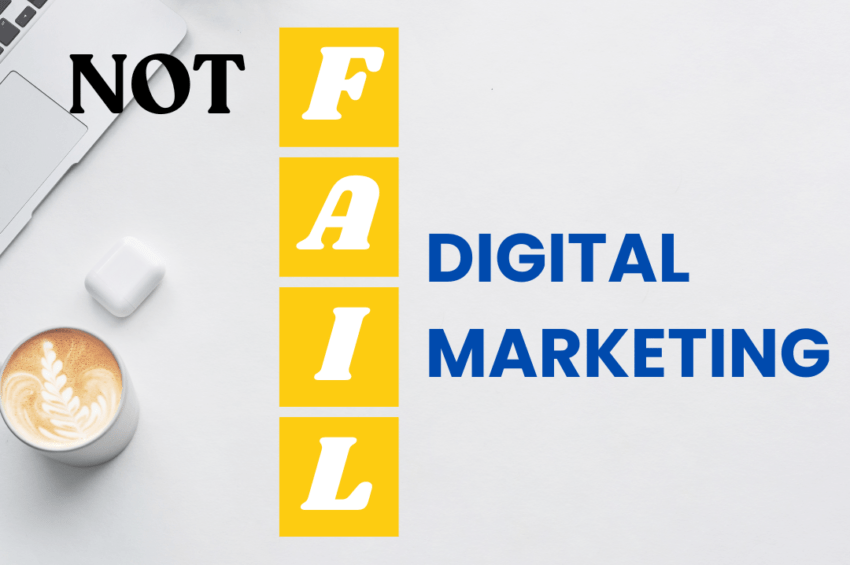
1. Understanding the Digital Marketing Landscape
2. Defining Clear Goals and Objectives
3. Conducting Thorough Market Research
4. Crafting a Strong Digital Marketing Strategy
5. Implementing Effective SEO Tactics
6. Building a Strong Online Presence through Content Marketing
7. Leveraging Social Media for Maximum Impact
8. Measuring and Analyzing Key Performance Indicators
Digital marketing has become an essential component of any successful business strategy in today’s highly connected world. However, with the ever-evolving nature of the digital landscape, it can be challenging to navigate and ensure your efforts are not in vain. To excel in digital marketing, it is crucial to understand the intricacies of the field, define clear goals, conduct thorough market research, and implement effective strategies. This article will guide you through the fundamental principles and strategies required to avoid common pitfalls and maximize your chances of success in the fast-paced world of digital marketing.
1. Understanding the Digital Marketing Landscape
1.1 The Evolution of Digital Marketing
Digital marketing has come a long way since the early days of static banner ads and email newsletters. With the rapid advancement of technology, digital marketing has evolved into a dynamic and multi-dimensional field. From search engine optimization (SEO) and social media marketing to content creation and influencer partnerships, there is a vast array of strategies and tactics available to businesses today.
To succeed in digital marketing, it’s crucial to keep up with the ever-changing landscape and stay ahead of the curve. Embrace the latest trends and technologies, experiment with new platforms, and always be open to learning and adapting.
1.2 Key Channels and Platforms in Digital Marketing
Digital marketing encompasses various channels and platforms that can be utilized to reach and engage with your target audience. Some of the key ones include:
– Search Engine Optimization (SEO): Optimizing your website and content to rank higher in search engine results and generate organic traffic.
– Social Media Marketing: Leveraging popular social media platforms like Facebook, Instagram, Twitter, and LinkedIn to build brand awareness, engage with your audience, and drive website traffic.
– Content Marketing: Creating valuable and relevant content, such as blog posts, videos, and infographics, to attract and retain your audience, and establish your brand as a thought leader in your industry.
– Pay-Per-Click (PPC) Advertising: Running targeted ads on platforms like Google Ads and social media networks to drive immediate traffic and conversions.
– Email Marketing: Sending personalized and targeted emails to nurture leads, build customer loyalty, and drive repeat business.
Understanding the strengths and nuances of each channel, and how they can work together, is essential for developing an effective digital marketing strategy.
2. Defining Clear Goals and Objectives

2.1 Setting SMART Goals for Digital Marketing
Before diving into digital marketing, it’s crucial to define clear and measurable goals. SMART goals are Specific, Measurable, Attainable, Relevant, and Time-bound. For example, instead of setting a vague goal like “increase website traffic,” a SMART goal would be “increase website traffic by 20% within the next three months through organic search.”
Setting SMART goals helps you stay focused, measure progress, and make data-driven decisions to optimize your digital marketing efforts.
2.2 Aligning Goals with Overall Business Objectives
Digital marketing should always align with your overall business objectives. Whether your primary goal is to increase sales, boost brand awareness, or build a loyal customer base, your digital marketing strategy should be designed to support and contribute to these objectives.
By aligning your goals, you ensure that your digital marketing efforts have a tangible impact on your bottom line and help drive long-term success for your business.
3. Conducting Thorough Market Research
3.1 Identifying Target Audience and Demographics
To effectively reach your audience, you need to understand who they are, what they want, and how they behave. Conducting thorough market research is essential for identifying your target audience and their demographics.
Use tools like Google Analytics, social media insights, and customer surveys to gather data on your audience’s preferences, interests, and online behavior. This information will help you tailor your digital marketing campaigns to resonate with your target audience and increase engagement.
3.2 Analyzing Competitors and Industry Trends
Staying ahead of your competitors requires keeping a close eye on their digital marketing strategies and tactics. Analyze what your competitors are doing well and identify areas where you can differentiate yourself.
Moreover, staying informed about industry trends and shifts allows you to anticipate changes and adapt your digital marketing strategy accordingly. Subscribe to industry blogs, attend conferences, and join online communities to stay up to date with the latest developments in your field.
4. Crafting a Strong Digital Marketing Strategy

4.1 Developing a Comprehensive Marketing Plan
Once you have a clear understanding of your audience and goals, it’s time to develop a comprehensive digital marketing plan. Outline the specific tactics, channels, and content you will use to reach your target audience and achieve your goals.
Your marketing plan should include a content calendar, SEO strategy, social media posting schedule, and a budget allocation for paid advertising campaigns. Additionally, consider how you will measure the success of your efforts and make data-driven adjustments along the way.
4.2 Allocating Budget and Resources
Digital marketing requires both financial and human resources. Allocate your budget strategically to maximize your return on investment (ROI). Consider investing in paid advertising campaigns, outsourcing specific tasks to experts, and investing in training and professional development for your team.
Remember, digital marketing is not a one-time effort but an ongoing process. Continuously monitor and optimize your campaigns, staying agile and open to experimentation. With a well-crafted digital marketing strategy, you can navigate the digital landscape successfully and achieve your business objectives.
5. Implementing Effective SEO Tactics

SEO (Search Engine Optimization) is the secret sauce of digital marketing. It’s like giving your website a makeover so it can charm search engines like Google and get more visibility. Here are two essential strategies to master:
5.1 On-Page SEO Optimization Techniques
Think of on-page SEO as the foundation of a well-optimized website. It involves optimizing factors like your page titles, headings, URLs, and meta descriptions. A few simple tweaks can go a long way in improving your search engine rankings. So, put on your SEO hat and start fine-tuning!
5.2 Off-Page SEO Strategies for Link Building
Off-page SEO is like having your cheerleading squad chanting for your website across the internet. It involves building quality links from other websites to yours. These links act as votes of confidence for search engines, improving your website’s authority and rankings. So, network like a pro and get others to sing your digital praises!
6. Building a Strong Online Presence through Content Marketing
Content marketing is the art of wooing your audience with valuable, entertaining, and informative content. It’s all about creating a genuine connection and building trust. Here’s how you can do it:
6.1 Creating High-Quality and Engaging Content
Take off your boring hat and put on your creativity crown! Creating high-quality and engaging content is the key to capture your audience’s attention. Whether it’s blog posts, videos, infographics, or podcasts, make them informative, entertaining, and easy to digest. Remember, you want your audience coming back for more!
6.2 Content Distribution and Promotion
Hey, don’t be shy about your awesome content! Once you’ve created it, it’s time to share it with the world. Spread the word on social media, engage with influencers, and even consider guest posting on other platforms. The more eyes on your content, the more chances of gaining loyal followers.
7. Leveraging Social Media for Maximum Impact

Ah, social media – the land of cat memes, food pics, and potential customers. Embrace the power of social media by following these steps:
7.1 Choosing the Right Social Media Platforms
Not all social media platforms are created equal. Understand your target audience and choose the platforms they hang out on. If you’re selling B2B, maybe LinkedIn is your best bet. If you’re appealing to visual lovers, Instagram could be your jam. Be strategic and focus your efforts where they matter.
7.2 Creating a Social Media Content Strategy
Social media is like a never-ending party, and you need to show up with the right content. Develop a social media content strategy that aligns with your brand’s voice and goals. Be consistent, engage with your audience, and don’t be afraid to inject some personality into your posts. It’s time to shine in the social media spotlight!
8. Measuring and Analyzing Key Performance Indicators
Data nerds, this one’s for you! To know if your digital marketing efforts are paying off, you need to measure and analyze key performance indicators (KPIs). Here are two vital areas to focus on:
8.1 Tracking Website Traffic and User Behavior
It’s like having your own digital spy network. Use tools like Google Analytics to track website traffic, user behavior, and demographics. Understand where your visitors are coming from and what they’re doing on your site. This intelligence is gold when it comes to making data-driven decisions.
8.2 Analyzing Conversion Rates and ROI
We all need a return on our investments, right? Analyze your conversion rates to see how many users are turning into customers or taking desired actions. Also, calculate your return on investment (ROI) to ensure your digital marketing efforts are giving you a bang for your buck. It’s time to be the Sherlock Holmes of your marketing campaigns!
Remember, digital marketing is like a wild rollercoaster ride. It may have its ups and downs, but with the right tactics, a pinch of creativity, and a dash of measurement, you can ride it to success. So, buckle up and enjoy the digital marketing adventure. In conclusion, by understanding the digital marketing landscape, defining clear goals, conducting thorough market research, and implementing effective strategies, you can position yourself for success in the realm of digital marketing. Remember to continuously adapt and stay abreast of industry trends to stay ahead of the competition. With a well-crafted digital marketing strategy and a data-driven approach, you can navigate the challenges, avoid common pitfalls, and achieve your desired results. Embrace the power of digital marketing and unlock new opportunities for growth and success in the digital age.
FAQ
1. Why is understanding the digital marketing landscape important?
Understanding the digital marketing landscape is crucial because it helps you identify the various channels and platforms available to reach your target audience. It allows you to make informed decisions about which strategies and tactics will yield the best results for your business.
2. How can market research benefit my digital marketing efforts?
Market research provides valuable insights into your target audience’s preferences, behaviors, and competitors’ strategies. By conducting thorough market research, you can tailor your digital marketing campaigns to resonate with your audience, stand out from the competition, and deliver meaningful value.
3. How often should I review and update my digital marketing strategy?
Digital marketing is a dynamic field, and it’s important to review and update your strategy regularly. As new technologies, platforms, and trends emerge, it’s crucial to stay agile and adapt your approach accordingly. It’s recommended to review your strategy at least annually, or whenever significant changes occur in your industry or target market.
4. How can I measure the success of my digital marketing efforts?
Measuring the success of your digital marketing efforts is essential to gauge the effectiveness of your strategies and make data-driven decisions. Key performance indicators (KPIs), such as website traffic, conversion rates, engagement metrics, and ROI, can provide valuable insights into the performance of your campaigns. Utilize analytics tools and regularly monitor and analyze these metrics to measure your success and make necessary adjustments to optimize your digital marketing campaigns.



